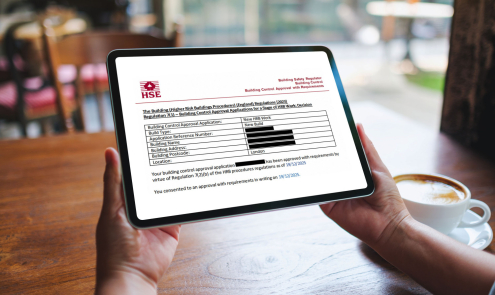UNCERTAINTY AROUND GAS BOILERS AND HEAT PUMPS - WHAT IT MEANS FOR THE BUILT ENVIRONMENT
30 Apr 2025
In January, the government announced it was making significant changes to its gas boiler plans, pressing ahead with its ban on installing gas boilers in new homes but scrapping a plan that would have stopped property owners replacing existing gas boilers with new ones. While the transition from fossil fuels is absolutely necessary, a wholesale ban on gas boilers by 2035 would be impractical – especially with a lack of viable alternatives and the national grid not currently having enough power to support heat pumps.
With energy efficiency and sustainability now at the forefront of building design and construction, the built environment needs to be given certainty and the government’s indecision around the potential banning of gas boilers means the industry can’t plan for the future.
This need for a definitive plan is exacerbated by the fact that home heating accounted for 18% of all UK greenhouse gas emissions in 2021 and the average UK gas boiler is reportedly responsible for more CO2-equivalent emissions in a year than taking seven transatlantic flights.
The government’s ban on gas boilers is understandable, given the need for more sustainable and greener heating alternatives, such as electric heating systems and heat pumps. However, there is still a lack of consistency and understanding on the technology available and the scalability of these alternatives.
For property designers, facility managers, and building owners, it can therefore be challenging to know which systems to invest in. For example, heat pumps - while an effective alternative to gas boilers - require more space, have a higher upfront cost, and a different installation process compared to traditional gas boilers. Developers and builders then need to adapt their designs to accommodate these systems, adding complexity to the design, planning, and building process.
Increased costs and financial challenges
While heat pumps and other green alternatives are more energy-efficient in the long term, they tend to have higher initial installation costs compared to traditional bas boilers. Property developers, designers, and architects may then need to balance increased upfront costs with delivering projects that are financially viable and meet the energy efficiency and sustainability requirements of the client.
This could make some projects more difficult to sell, especially if the upfront cost of installing sustainable heating systems is passed onto buyers.
Additionally, the ongoing uncertainty around the government’s incentives to ease the transition from fossil fuels may see property developers and owners less keen to commit to green technologies, such as heat pumps.
Design and retrofit challenges
While the government has indicated it will scrap its ban on gas boilers in existing buildings being replaced by new ones, the UK’s 2050 net zero target exacerbates the need for the retrofitting of these properties and the implementation of greener technologies. However, unlike newly built properties that can be designed with heat pumps or other low-carbon alternatives in mind, retrofitting older buildings to account for sustainable technologies can be a complex and costly process.
Indeed, retrofitting buildings to accommodate new heating systems will require a high degree of expertise, which increases the importance of early collaboration with experienced MEP design consultants.
Although the government’s desire to reduce carbon emissions through the banning of gas boiler implementation in new builds presents opportunities for architects, contractors, and property developers, the current uncertainty and contrasting opinions could cause significant challenges. For instance, contractors, developers, and builders may have to prepare for rising costs, supply chain delays, and retrofitting concerns while simultaneously embracing innovative approaches and new greener technologies.
Uncertainty around government support
There is still a lot of confusion and uncertainty in the built environment when it comes to gas boilers and heat pumps. While the government is keen to encourage decision-makers to transition from fossil fuels to more sustainable technologies, regulations are ever-changing, meaning property developers, architects, and designers are still awaiting further details and confirmation on how the government plans to implement any sort of ban on gas boilers. Additionally, the questions around the availability of grants, subsidies, or financial incentives to help developers transition to greener alternatives remain unanswered.
Indeed, the government may have announced it is scrapping the ban on the like-for-like replacement of gas boilers in existing properties, but if it decides to change its mind again, the construction industry could face an overwhelming challenge of upgrading the UK’s housing stock with very little time before the 2050 net zero target.
Navigating this uncertainty will require builders, contractors, architects, and property developers to stay informed, invest in training, and monitor government support programmes that will help ease the transition from fossil fuels.
Working closely with experienced MEP design consultants, such as Whitecode Consulting, will certainly help in this regard. Taking advantage of the expertise and knowledge of experts enables a much greater understanding of the options available and the benefits of utilising greener technologies to reduce carbon emissions and cut energy expenditure.
By doing so, the built environment can not only weather the challenges ahead but also play a crucial role in reducing the UK’s carbon emissions ahead of the 2050 deadline.

WHITECODE CONSULTING GAINS HIGHLY...
As a company that prides itself on sustainability in design and exceeding – not just meeting – industry standards, Whitecode Consulting is delighted to announce it has gained the coveted Chartered Institution of Building Services...
Read More
Passing Gateway Two: What you need to know...
Gateway Two is a key aspect of building safety and quality. However, the Building Safety Regulator’s (BSR) approval process is causing significant backlogs in UK construction projects. While indications suggest the BSR itself...
Read MoreLike to Know More? Let's Talk...







